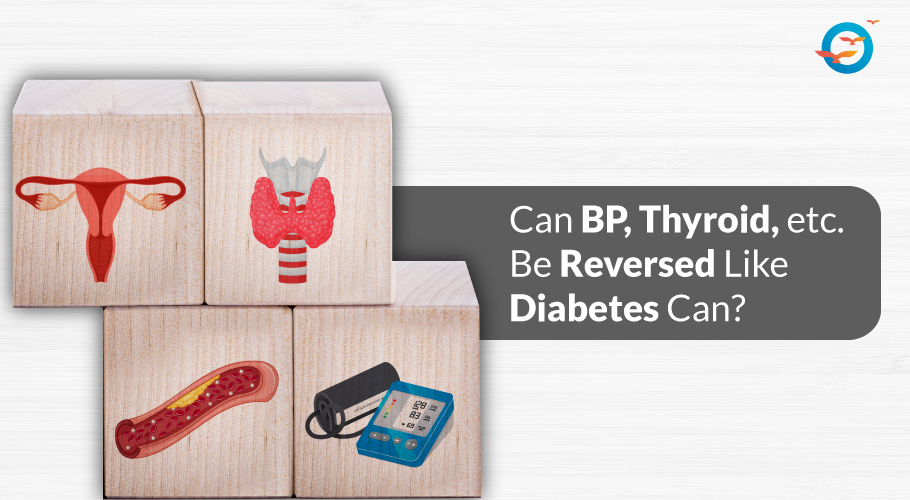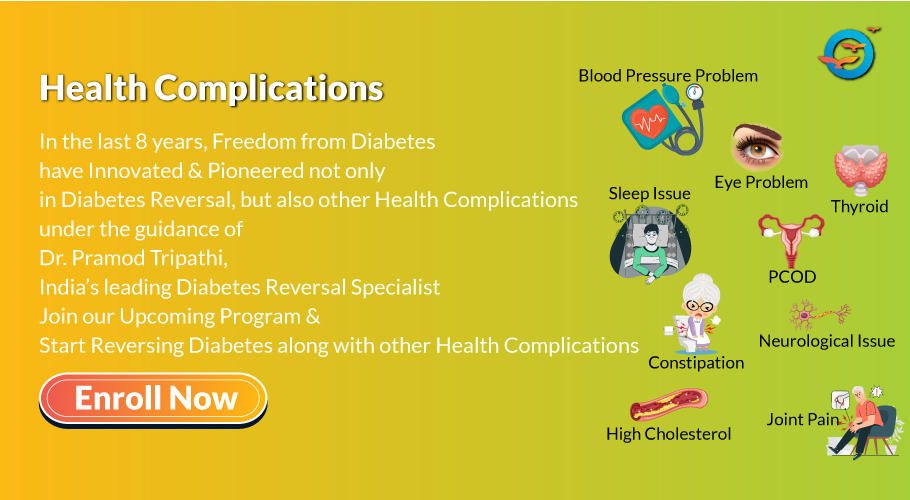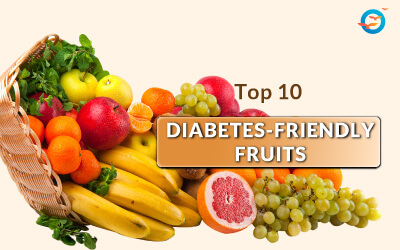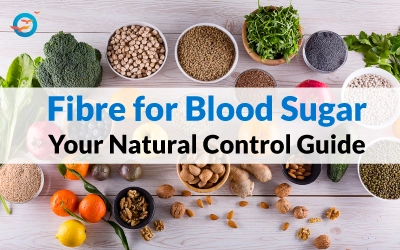Can BP, Thyroid, etc. Be Reversed Like Diabetes Can?

For a long time, it was believed that diabetes was a chronic lifelong disease that could only be managed. Patients were routinely told that their affliction and accompanying medication would be for life.
Worse, as time passed the disease inevitably resulted in higher dosages, medications became progressively stronger and other complications crept in, from vision problems to heart and kidney disease.
Then, a number of medical doctors and researchers began questioning the prognoses provided by the traditional medical establishment.
Their research and studies shed new light on the root cause of diabetes, and doctors like Neal Barnard, Roy Taylor, and FFD’s own Dr. Pramod Tripathi, evolved diabetes reversal programs that proved repeatedly that diabetes could be reversed.
Since 2013, when Freedom from Diabetes began conducting diabetes reversal programs, we have successfully helped over 12000 diabetics completely reverse their diabetes.
And not just diabetes, many of them who were also suffering from other disorders related to insulin resistance, such as hypertension, hyper-, and hypothyroidism, PCOD, etc., found their illnesses ebbing, medications reducing, and even disappearing completely.
So does that mean that like diabetes, other problems like high BP, high, cholesterol, thyroid, etc. can be reversed? The evidence certainly points to it.
The biggest game-changer in this quest for reversal has been the realization that all these disorders, be it diabetes, hypertension, PCOD or BP are actually symptoms themselves, in a manner of speaking.
The root cause is insulin resistance, and the trigger is a lifestyle. Even genetics takes a backseat to lifestyle, as the cause for these problems.
Rising urbanization and the unhealthy diets, and sedentary lifestyles that go with it have enabled this unrecognized, rising pandemic of non-communicable chronic diseases.
But there is hope yet, and it is not on the shelves of your pharmacy but in your kitchens, herb gardens, and spice racks; it is in your own living rooms, exercise studios, gyms, parks, and your bedrooms.
Through a series of articles, we take a deeper dive into these so-called “lifestyle diseases” to understand more about their causes, risk factors, and how they can be treated holistically.
PCOD/PCOS
Polycystic Ovarian Disease (PCOD) and Polycystic Ovarian Syndrome (PCOS) are ovarian disorders that can attack any woman of childbearing age. It is caused by cysts in the ovaries, which lead to excessive production of androgen and estrogen hormones.
This compromises the ability of the ovaries to nurture eggs to maturity, and the woman to conceive successfully. While it shows up in women between 18 and 45 years of age, the problem begins much earlier, although the symptoms are not noticeable.
Our article: PCOD—causes, symptoms, and treatment provides a closer look at this disorder and offers usable tips to treat and prevent it.
POCD v/s PCOS
Although they are used interchangeably, and are both disorders of the ovary, PCOD and PCOS are not the same at all. PCOD is far more prevalent across the world and less likely to prevent conception than PCOS.
However, both PCOD and PCOS are linked to unhealthy diets, sedentary lifestyles and high stress levels. These factors result in ovaries producing and releasing immature eggs. PCOS on the other hand is an endocrine disorder, where the body produces higher quantities of male hormones.
This shows up in patients through problems like hirsuteness, acne, and hair loss. Unlike PCOD, where women still retain the ability to conceive, PCOS impacts the woman’s ability to get and carry a pregnancy successfully. Genetic factors do play a role in both these problems.
The good news is that with a little discipline and proper guidance, one can treat these problems holistically using natural treatments. To know more about the difference between PCOD and PCOS browse through our articles entitled: the difference between PCOD & PCOS and Treating PCOD/s naturally
High Blood Pressure
Described, as a ‘silent killer’ because it shows almost no symptoms, hypertension, or High BP, as it is commonly called, is a literal killer. It is basically a result of the agglomeration of cholesterol—called plaque— on arterial walls.
This narrows the arteries and hardens them, resulting in narrower, stiffer blood vessels, which forces the heart to pump with more pressure.
As pressure builds up, it begins to damage the delicate framework and sensitive pathways of smaller capillaries of the organs, like the renal pathways in the kidney, for instance.
Sometimes, a chunk of plaque gets dislodged and obstructs the artery, this can result in a heart attack; or an aneurism can develop, causing a stroke, if it happens to be in the brain.
There are drugs that can be taken to bring high BP down, but these are often for life. If you’re looking for a more natural and holistic treatment approach, dive into our article: High Blood Pressure—Causes, Symptoms & Treatment, here.
Treating High BP
A diagnosis of high BP often comes with a lifetime prescription for medicines, usually followed by an online search for “How to reduce high BP naturally” Our article on the same topic lists the top ten ways you can reduce your blood pressure naturally. You can read it here
Low BP
On the flip side of hypertension lies low BP. Now, it’s natural to assume that since high BP is bad, the converse must be true; i.e. low BP is good. Not so. Low BP is just as bad as high BP.
One big difference though is that it has many visible symptoms, the most obvious one being dizziness. There are many potential causes for low BP, from hormonal imbalance to heat stroke.
Fortunately, there are also several actionable ways to treat low BP, and our article: Low BP—Causes, Symptoms, and Treatment, walks you through the most popular ones.
Cholesterol
The link between high cholesterol and heart attacks and strokes has created understandably negative perceptions with the word ‘cholesterol’. But cholesterol is actually an essential component that your body needs for your metabolism to function normally.
It is a vital element for hormone production, bile production, Vitamin D synthesis, etc. Cholesterol is actually defined as good or bad by the lipoprotein that carries it.
Thus Low-Density Lipoprotein (LDL) is considered ‘bad’ because it transports to the cells, where it can build up and cause heart attacks and strokes.
High-Density Lipoprotein, on the other hand, transports cholesterol to the liver where it is broken down and disposed off.
What we need is a balance between LDL and HDL, when LDL levels rise—mostly because of the animal produce and fat in our diets—the problems begin.
Can Cholesterol Be Reversed Naturally?
As we have seen, your body needs cholesterol for many metabolic activities, like producing hormones, creating bile, Vitamin D, etc. But it doesn’t need your help to get the cholesterol it needs.
Your body is fully capable of producing all the cholesterol it requires. So, when we consume fatty, greasy foods, processed foods, salt, animal dairy and dairy products and confectionery items, we automatically increase the volume of cholesterol in the system to unhealthy levels.
Like many other non-communicable chronic diseases, high cholesterol too shows few to no symptoms in the initial stages. The only way to identify the problem is by getting regular health checks.
Since diet is the major cause of cholesterol getting into the system, it follows that reversing unhealthy dietary habits are key to reversing the problem.
In addition to dietary changes, one should also inculcate desirable lifestyle changes, such as: stopping smoking, exercising, losing weight, and managing blood sugar.
For a detailed look at the various ways, you can reduce your cholesterol naturally, read our article: 5 ways to lower cholesterol without medication.
Thyroid
When you feel full of energy, healthy and fit—that’s your metabolism at work. And your metabolism is ruled by a tiny butterfly-shaped gland near your trachea. This is your thyroid, and it controls your metabolism through two hormones, T3 and T4.
Too much thyroid hormone and your metabolism speeds up, burning energy and shedding weight at a high rate; too little and you feel sluggish and enervated and prone to weight gain.
The thyroid itself is managed by the pituitary gland that releases Thyroid Stimulating Hormone (TSH), which tells the thyroid how much T3 or T4 it needs to release to keep your metabolism on an even keel.
For more information on the thyroid, problems, symptoms, and treatments, read Thyroid—Causes, Symptoms, and Solutions.
Treating Thyroid Problems
Thyroid hormones are necessary for balanced metabolism. If this goes out of sync, you will notice high metabolic activity, feeling extra energetic, losing weight, etc.
This is known as hyperthyroidism; conversely, if the level of thyroid hormone drops, you will experience sluggishness, and pervasive weight gain.
There are many possible causes for thyroid problems, from genetics to dietary. While surgery and medicine are the most common approaches to treat thyroid problems, there are several holistic, natural treatments that have worked wonders for thyroid patients.
To learn more about these treatments and how to put them into practice, read our article: Ways to Reverse Thyroid, Naturally.
Holistic Health Transformation
Our lifestyles have a huge impact on our life and health. How and what we eat, exercise, sleep, manage our waking and sleep schedules, and our stress…there are a myriad lifestyle elements that impact our health.
Unhealthy diets rich in carbohydrates, fat, processed food, salt, sugar, etc., combined with low levels of exercise and high levels of stress inevitably lead to an insidious problem called insulin resistance.
Insulin is a hormone needed to move blood glucose (which comes from the food you eat) from your blood to your muscle cells (where it is burned to create energy).
When the insulin produced in the body is unable to function as required, glucose builds up in the blood and, left untreated, leads to a host of problems like diabetes, hypertension, high cholesterol, PCOD/S, and more.
FFD’s programs, which are built on four fundamental protocols of diet, exercise, stress management, and medical supervision, have helped tens of thousands reverse not just diabetes, but insulin resistance itself, thereby transforming their lives and giving them the tools and knowledge to stay healthy and happy.
You can learn more about holistic health transformation, and FFD’s own Holistic Transformation Program, here.
FAQs
How does insulin resistance affect health?
Insulin resistance is the root cause of various health issues like diabetes, hypertension, high cholesterol, and PCOS. It occurs when the body's insulin can no longer effectively move glucose from the blood into cells, leading to health complications.
What is the difference between PCOD and PCOS?
PCOD (Polycystic Ovarian Disease) is more common and less likely to cause infertility than PCOS (Polycystic Ovarian Syndrome), which is a more severe hormonal disorder affecting a woman's ability to conceive and can cause symptoms like acne and hair loss.


